Backblaze vs Carbonite: Who Has The Better Service in 2025?
Backblaze and Carbonite are two cloud backup services with a lot in common. They both focus on ease of use over providing a bunch of advanced features. Both of them also provide unlimited storage, one computer per license and excellent security, but they suffer from mediocre speed. Thus, we’ve put together this Backblaze vs Carbonite comparison to find out which one is the better service.
Because this is such a close comparison, users looking for a simple cloud backup service to combine with the top cloud storage services will be well served by either one. However, to spoil things a bit, we think Backblaze is slightly better, for reasons we’ll go into as we put the two services through eight rounds covering all of our regular cloud backup review criteria.
If you’re wondering what else is out there in terms of cloud backup, you can check out our list of the best online backup providers. You can also read our Backblaze review and Carbonite review, as well as our IDrive vs Carbonite comparison.
-
10/26/2022
Updated Carbonite’s prices.
- 1
- :
- :
- :
- :
- :
- :
- :
- 2
- :
- :
- : Yes but not on Basic plan (all other plans)
- : Yes but only on Safe Backup Pro plan
- :
- :
- :
1. Features
Neither service is what you’d call feature-rich. Both focus on providing a simple and streamlined backup process with unlimited storage, all without overloading users with too many advanced features.
Both services are available on Windows and Mac, but not on Linux. If you use the latter, check out our list of the best online backup for Linux to find an alternative. Both services make it onto our lists for the best cloud backup for Mac and best online backup for Windows, though, so if you’re not a Linux user, either is a good option for data backup for your desktop device.
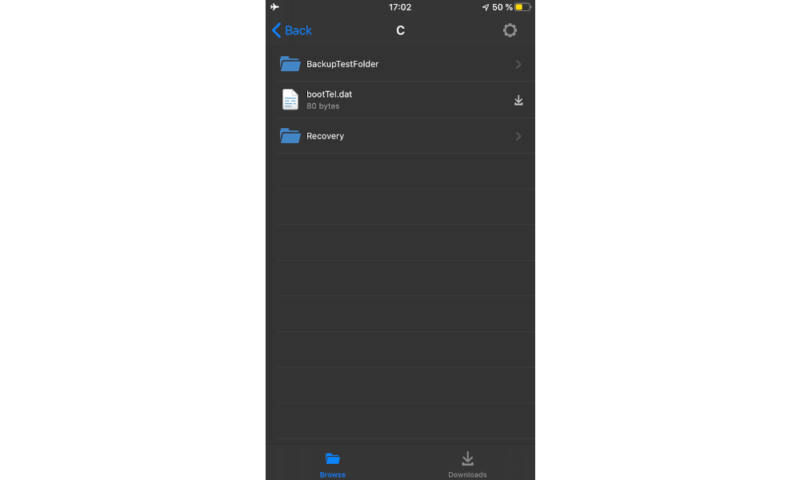
There’s also no mobile backup for either service, but Backblaze has a mobile app for iOS and Android that you can use to access and manage your files remotely.
Backup Features
In terms of versioning, Backblaze retains deleted and changed files for a maximum of 30 days. For deleted files, this is the same as Carbonite, but when it comes to old versions of changed files, Carbonite instead limits you to 12 archived versions rather than a simple time limit. If you’re looking for a service with unlimited versioning, check out SpiderOak ONE instead.
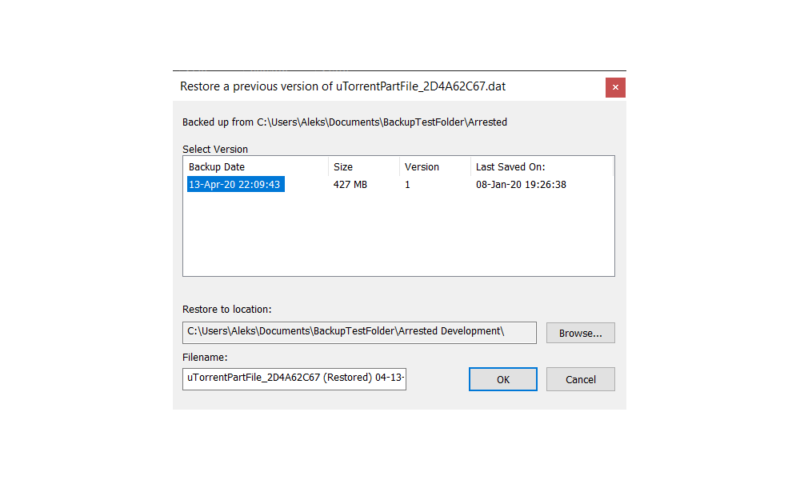
Both services also employ a block-level algorithm for uploads, meaning you won’t waste bandwidth reuploading entire files when they’ve been changed. You can perform external hard drive backup with either service, but Carbonite locks this behind its more expensive plans.
Neither service offers image-based backups, meaning you can’t create a complete clone of your device to store online. There’s no hybrid backup, either, so you’re stuck with uploading your files to online storage. Both of these features are available in IDrive, though, so consider that service instead if you want these things.
Backblaze doesn’t let you backup any servers with its service, but Carbonite does, provided you subscribe to one of the more expensive server plans. On the other hand, Backblaze does support NAS backups, which again is something you only get with Carbonite if you opt for one of the pricier plans, in this case the Safe Backup Pro plan.
Courier Recovery
If you have a slow internet connection, you can use a courier recovery service to restore your data with both services. For Backblaze, this takes the form of a USB flash drive for restores of 256GB or less, and an external hard drive for restores up to 8TB.
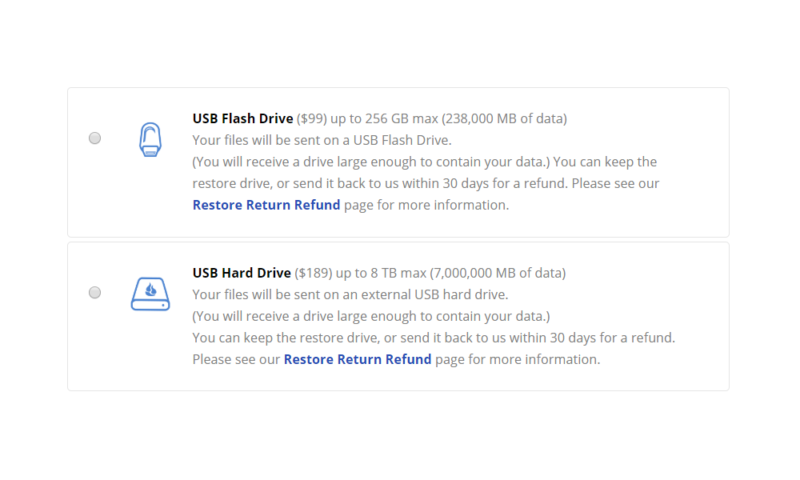
Carbonite, on the other hand, has no upper limit, and the size of the external hard drive sent to you is determined by the size of your restore. This means that if you want to restore 5TB of data, the service will ship a 5TB external hard drive to you.
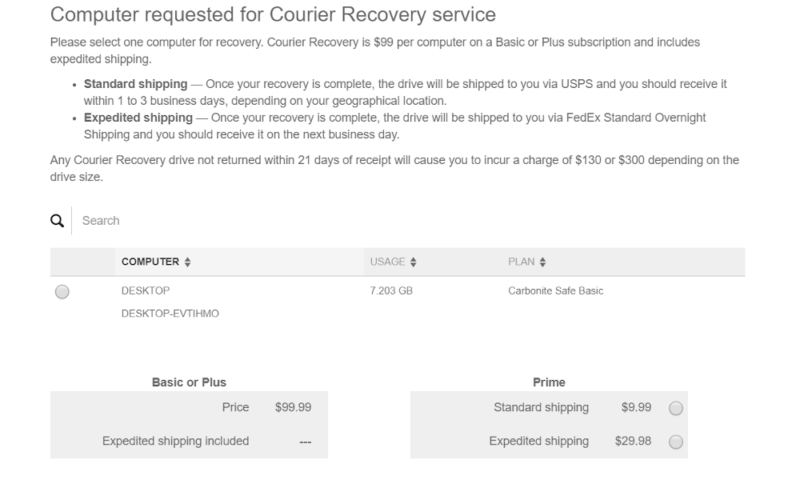
Other Features
Aside from the backup features themselves, Backblaze offers some tangential functionality that Carbonite doesn’t. This includes file sharing, something that’s more common for cloud storage providers, as opposed to cloud backup services.
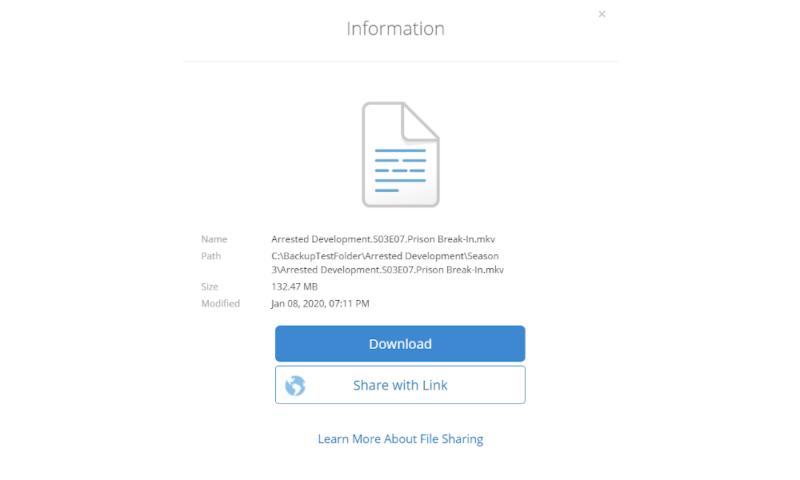
If you’re not quite clear on what this distinction means, check out our guide on cloud storage vs online backup to learn more. You can also check out our cloud space comparison if you’re less interested in performing regular backups than you are with sharing and syncing files across devices.
Backblaze also lets you inherit the backup state from a different device, which is great if you’ve switched computers but want to keep your backup settings. Finally, it also includes a “find your computer” type of feature that helps you locate your device in the event of theft or loss.
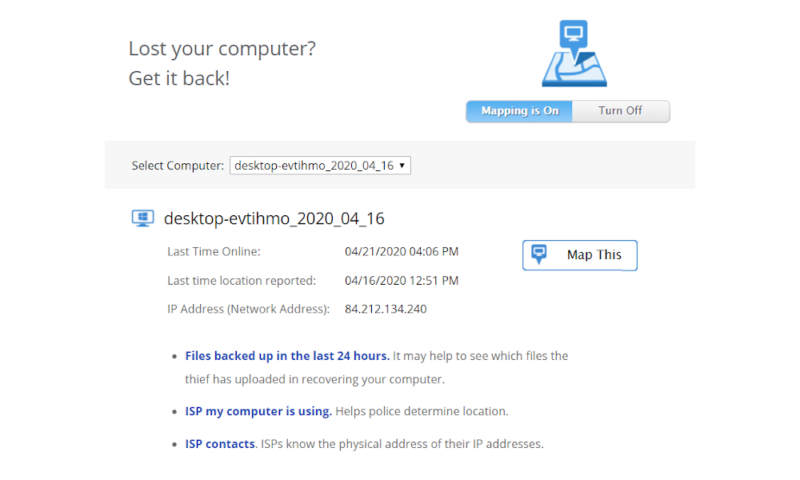
Neither of these two contestants provide a whole lot in terms of features, so we recommend checking out our IDrive review or Acronis Cyber Protect Home Office review if you’re the type of user who prefers a rich set of functionality over a streamlined backup process.
If you’re looking for an online backup service that offers unlimited storage for your business, you can read our CrashPlan review. While still at it, read our CrashPlan vs Backblaze review to see how the two top dogs compare.
Despite not being a feature-rich backup service by any means, Backblaze earns the victory in this round, as it still significantly outperforms Carbonite in terms of functionality.
2. Pricing
The prices for Backblaze and Carbonite are very similar at a glance, as they both offer unlimited storage for $8 or less per month (something that’s not even an option in IDrive’s pricing). However, when you dig into the plans a little more, there are some significant differences in what features are available and how much you pay long term.
If you don’t want to pay a monthly fee, you can go for Acronis Cyber Protect Home Office instead, which offers its backup software for a one-time fee, rather than a recurring subscription.
In terms of courier recovery prices, Carbonite is significantly cheaper than Backblaze. The former charges $99 per request, regardless of size. It also offers a hefty discount to Safe Prime subscribers, who can use the service for as little as $19. Backblaze, on the other hand, charges $99 for restores of 256GB or less and $189 for anything up to 8TB.
Backblaze also offers a full year of its backup service for $60, whereas its not possible to pay monthly for Carbonite, meaning it has a yearly price tag of $49.99.
- Cheaper price with promo link
- Unlimited GB
- Unlimited GB
- Unlimited GB
More plans
- 250GB
- 500GB
- 500GB
Furthermore, while Backblaze offers only a single plan that includes all of its features, Carbonite has several tiers with some significant functionality locked behind the more expensive plans. This includes external hard drive and server backup, as well as automatic video uploads and 256-bit encryption.
All this makes the pricing round an easy win for Backblaze. The reason for that is, quite simply, the cost. Both Carbonite Basic and Backblaze let you backup unlimited data for one computer, but Backblaze lets you do it for $10 less per year and comes with discounts via the Backblaze offer code. Plus, Carbonite Basic doesn’t include external drive backup. That means the score is now 2-0, cementing Backblaze’s early lead.
3. Speed
Speed is a problem for both of our contestants in this Carbonite vs Backblaze comparison, but in different ways. Carbonite is incredibly slow when restoring your data, while Backblaze does this very quickly but is instead slow when uploading, especially during your initial backup.
This is somewhat surprising, as Backblaze supports multithreading where Carbonite doesn’t, which should in theory make the former’s uploads faster.
When testing the speed of each backup service, we used a fiber connection with an upload and download speed of 50 Mbps to transfer a 3.51GB folder filled with various types of files. This means that each transfer could theoretically finish in about 10 minutes, but more realistically we expect them to finish in roughly 15 to 20 minutes.
Both tests were performed from Oslo, Norway, to a data center located in the U.S. Although Backblaze operates a data center in the Netherlands (which would’ve offered better speeds for our location), we wanted to make the tests as similar as possible. Users in North America (or Backblaze users in Europe using the Dutch data center) should see better results.
| First Attempt: | Second Attempt: | Average: | |
|---|---|---|---|
| Backblaze Upload | 0:42:00 | 0:41:00 | 0:41:30 |
| Backblaze Download | 0:15:00 | 0:15:00 | 0:15:00 |
| Carbonite Upload | 0:19:00 | 0:26:00 | 0:22:30 |
| Carbonite Download | 0:32:00 | 0:31:00 | 0:31:30 |
Based on these results, picking the winner of this round of our Carbonite vs Backblaze comparison is pretty subjective, as it depends on whether you prioritize a quick backup or a quick restore.
We’ll give Backblaze the win here, as we think restoring your data is probably a more time-critical task than backing up. This takes the score to 3-0, which is starting to make this battle look like a slam dunk for Backblaze.
4. Ease of Use
Ease of use is clearly where both services focused their efforts when designing their software. The backup app for both is very simple, without a lot of menus or settings to complicate things.
In Carbonite’s case, the client is basically just divided into two panels: one for your backup and one for some basic settings, like scheduling and pausing your backup. Backblaze is similar, with a main panel showing the status of your backup and a settings window where you can adjust how the client operates.
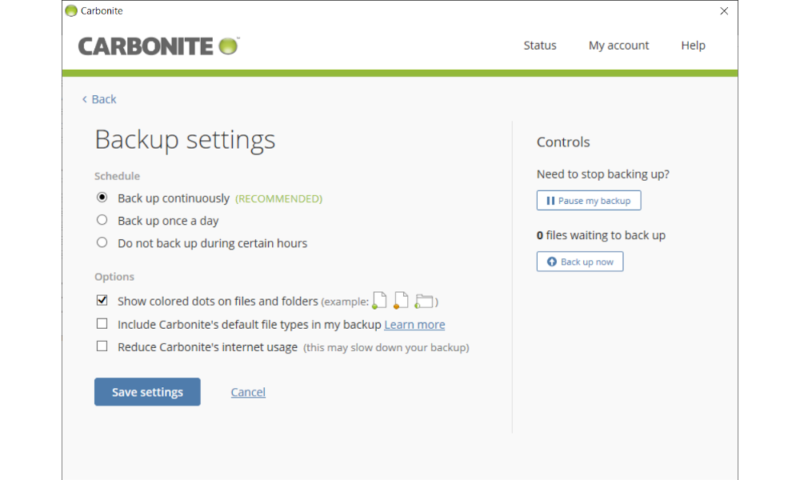
There’s a bit more to Backblaze’s settings than Carbonite’s, though, including file exclusions, performance settings — like multithreading and throttling — and a list of files scheduled for backup.
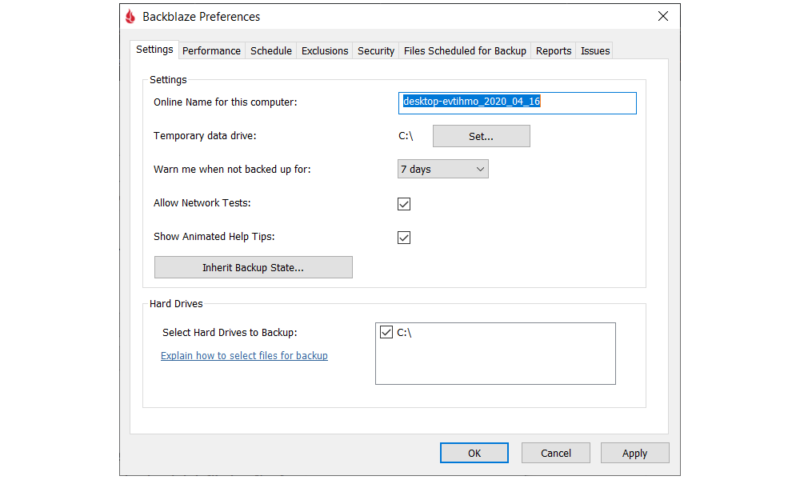
Carbonite also sets up a virtual drive on your computer called “Carbonite Backup Drive” where you can see all the files you have backed up, as well as the ones that are pending.
Here, you can restore old versions of files and remove data from your online storage. This puts it ahead of Backblaze because, with the latter, the only way to instantly remove files from your cloud storage is to delete the entire backup.
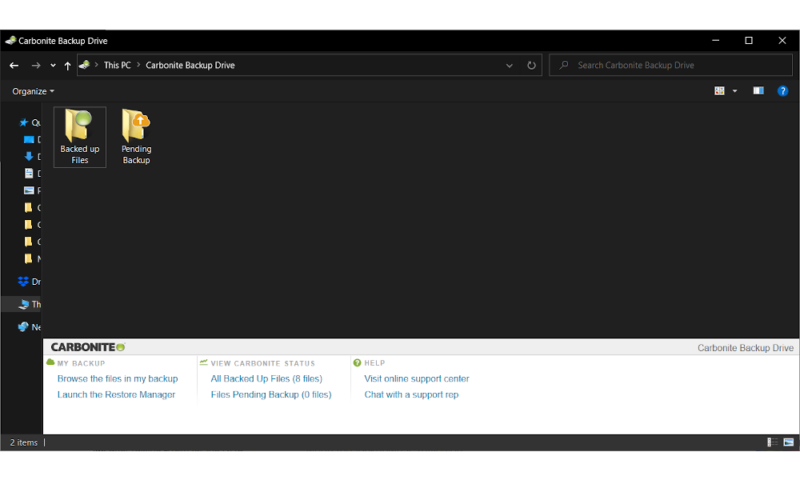
With all this in mind, Carbonite ekes out a win in this category, earning its first point in our comparison and bringing the score to 3-1.
5. Backup Process
Setting up your backup to cloud storage is very easy to do with both services. With Carbonite, you simply right-click the files or folders that you want to backup online and select the “back this up” option in the context menu, and that’s it.
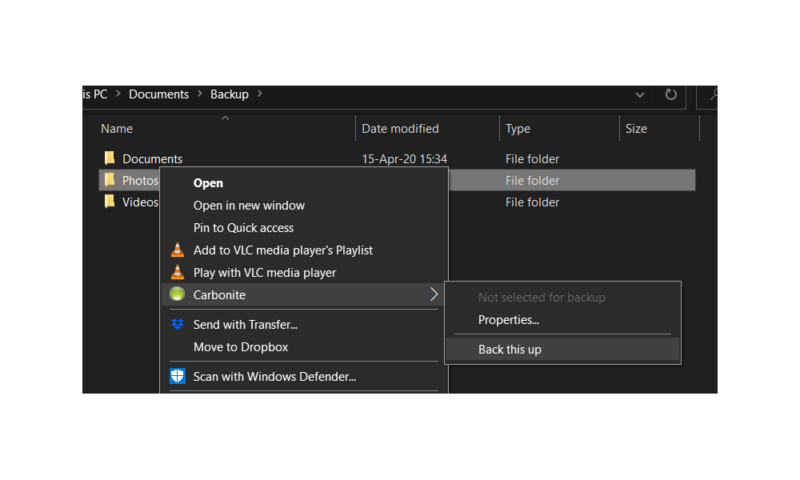
Backblaze, on the other hand, automatically scans your computer and uploads anything that isn’t listed under “exclusions” to your online storage. While this is great for users who want to take advantage of Backblaze’s unlimited storage to backup all of their data, it does make manually choosing what files you want to upload a bit clunky.
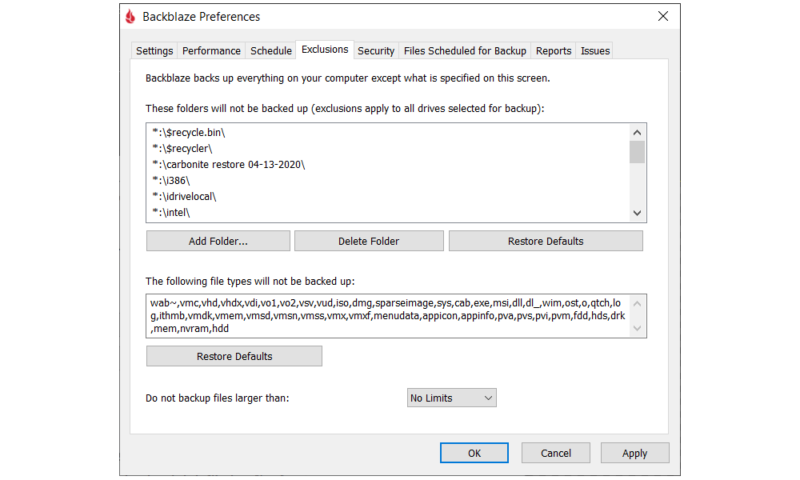
To do so, you have to essentially set up the data backup in a backward direction, picking what files you don’t want uploaded to online storage rather than the ones that you do.
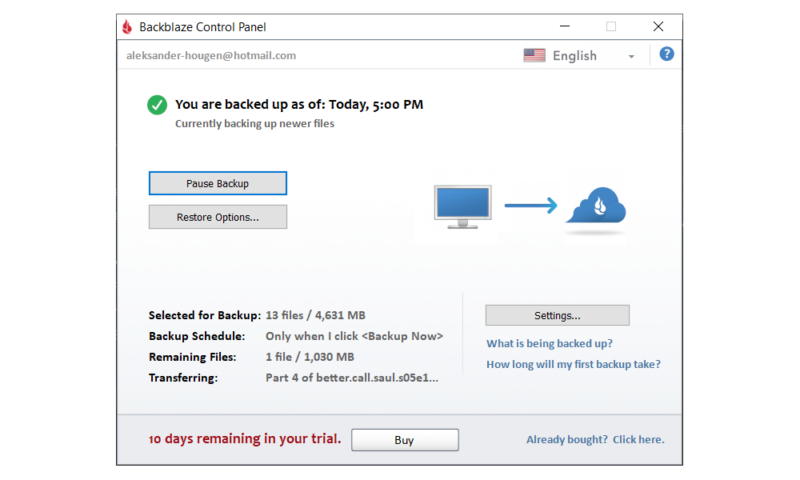
Backblaze also doesn’t tell you much about the status of your backup. There’s no progress bar and it’s hard to tell what is currently being uploaded, unless your files have very short names. This is in stark contrast to Carbonite, which gives you plenty of info on your backup’s progress.
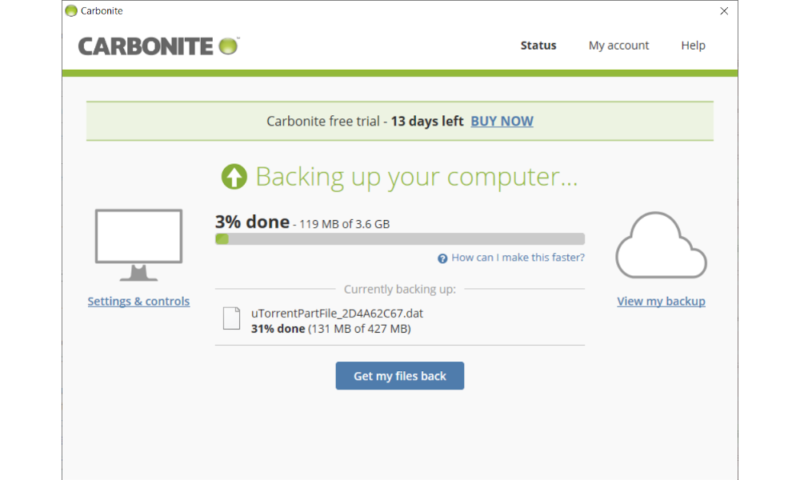
Because of this lack of information, as well as no manual file selection, we’re giving this round to Carbonite, which brings the score to 3-2.
6. Security
Once again there’s a lot of similarities between the two cloud backup services. Both offer solid encryption, though Backblaze offers AES 256-bit for all customers while Carbonite restricts anyone not on a server plan to AES 128-bit. Both of these encryption protocols are more than sufficient to protect your data, though, so there’s not much difference, in practice.
Carbonite actually acquired the cybersecurity company Webroot (as well as the backup service Mozy) back in 2019 in order to place a heavier emphasis on keeping your files safe from cybercriminals.
When your data is in transit, both services protect it using SSL. Both also allow you to set up two-factor authentication, which provides an extra layer of security if your password becomes compromised.
The actual data centers that house your data are hardened, regardless of which service you use. This means that they’re safe from natural disasters, loss of power or physical intrusions, like break-ins.
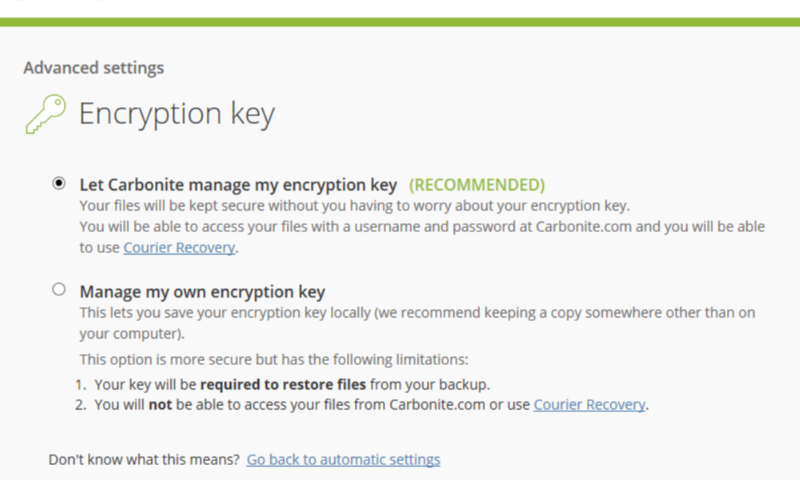
However, despite the similarities, there is one significant difference between Carbonite and Backblaze, and that is its implementation of encryption. Because of how Backblaze handles the data restore process (you have to upload your encryption key to restore your backup), it doesn’t offer truly private encryption.
This potentially leaves the door open for man-in-the-middle attacks, not to mention the privacy implications, which we’ll talk more about in the next round.
Because of this, we’ll have to give this round to Carbonite, even if every other aspect of the two cloud backup services’ security is pretty similar. With this win, Carbonite has managed to close the distance, leaving the two services tied at 3-3.
7. Privacy
Like with security, privacy is another category where there’s a significant difference between the two backup services. Once again, this comes down to Backblaze’s approach to encryption.
Because you need to give up your encryption key to Backblaze to restore your data, this means the encryption isn’t really private at all. Theoretically, this gives Backblaze the power to access your files or decrypt them and hand them over to someone else.
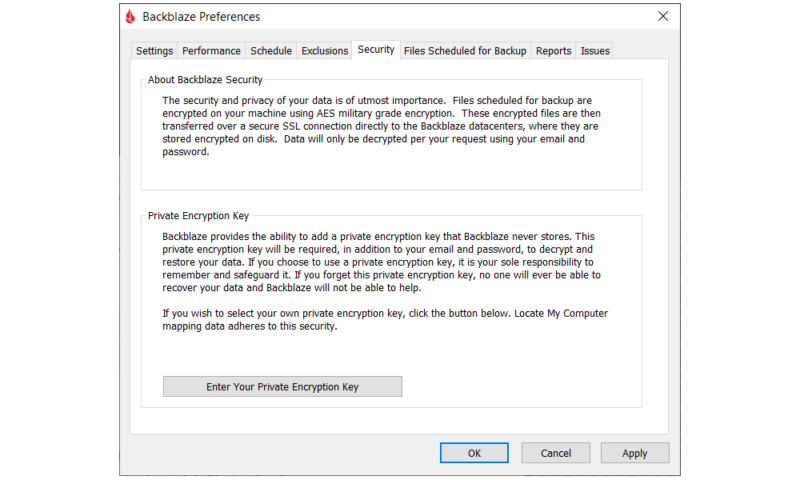
Both providers store most of their users’ online backup data in the U.S., which is less than ideal, given its poor cloud privacy laws. Examples of this include the Patriot Act, the infamous PRISM program and the intelligence-sharing network called the Five Eyes.
Although Backblaze does allow users to opt for its data center in the Netherlands instead, this is only marginally better, as we explained in our guide on the best VPN for the Netherlands.
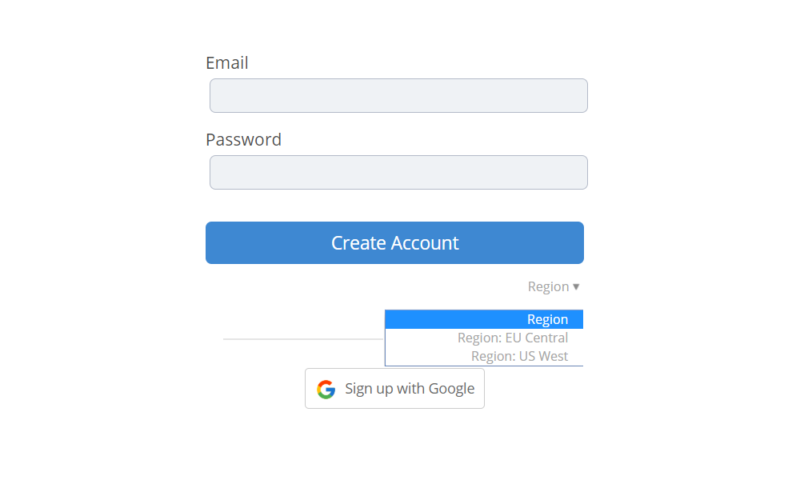
Both services have clear-cut privacy policies that state that the companies never sell your personal information for any reason and will only share it with trusted third-party partners or the authorities, if required to do so by law.
The only information they collect is basic personal information that you provide when registering an account, as well as some anonymized usage data, such as total data sizes and IP addresses.
Both services comply with GDPR and HIPAA, though Carbonite complies only with the latter on its server plans. Backblaze also follows a host of other official regulations, such as the EU/Swiss Privacy Shield for international data transfers.
Despite Backblaze complying with a lot more privacy regulations than Carbonite, we still have to give this round to the latter. At the end of the day, the most important thing a cloud backup service can do to protect your privacy is to provide truly private encryption, which Backblaze doesn’t do, meaning it’s not a zero-knowledge service.
This means that, despite Backblaze taking an early lead, Carbonite has managed to creep ahead. With the score at 4-3 in Carbonite’s favor, we can proceed to our final round.
8. Support
Both backup services offer similar customer support. There’s a searchable knowledgebase that you can use to solve basic problems, as well as email and chat support.
Carbonite also offers phone support, but it’s available only in three countries: the U.S., the UK and Brazil. Neither service has 24/7 support, but we managed to get a response via email within 24 hours from both of them.
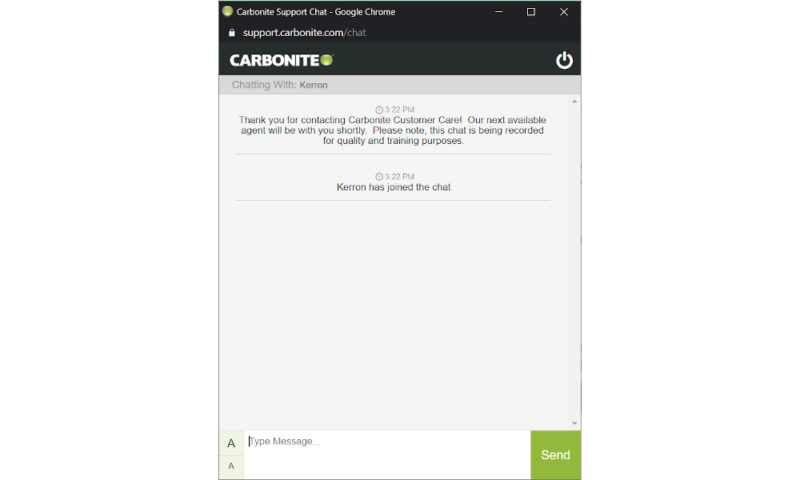
However, when we contacted Carbonite, it took a few emails back and forth to actually get an answer to our technical question, whereas Backblaze cut right to the chase in its first response. Because of this, we’ll give this round to Backblaze, even though it’s another very narrow win, leaving us with a tie as the final score settles on 4-4.
9. The Verdict
That’s a wrap for our Carbonite vs Backblaze battle. Despite the two services being incredibly similar, we think Backblaze narrowly edges out Carbonite, mainly due to its simpler pricing structure and richer feature set.
However, users who are more concerned with privacy and security for their files will be better served by Carbonite, as its implementation of encryption is superior to Backblaze’s. We also think setting up your backup is a bit simpler with Carbonite, since Backblaze doesn’t let you pick and choose files as easily. Check out our list of the best Carbonite alternatives.
Winner: Backblaze
Backblaze narrowly defeated Carbonite in our review, but does it edge out other popular services such as Dropbox? Read our Backblaze vs Dropbox comparison to learn more.
What do you think of our Carbonite vs Backblaze comparison? Do you agree that these are two incredibly similar services with very little separating them from each other? Or do you think that there are some bigger differences that we missed and that this comparison has a more obvious winner? Let us know in the comments below, and check out our list of Backblaze alternatives, too. Thank you for reading.

